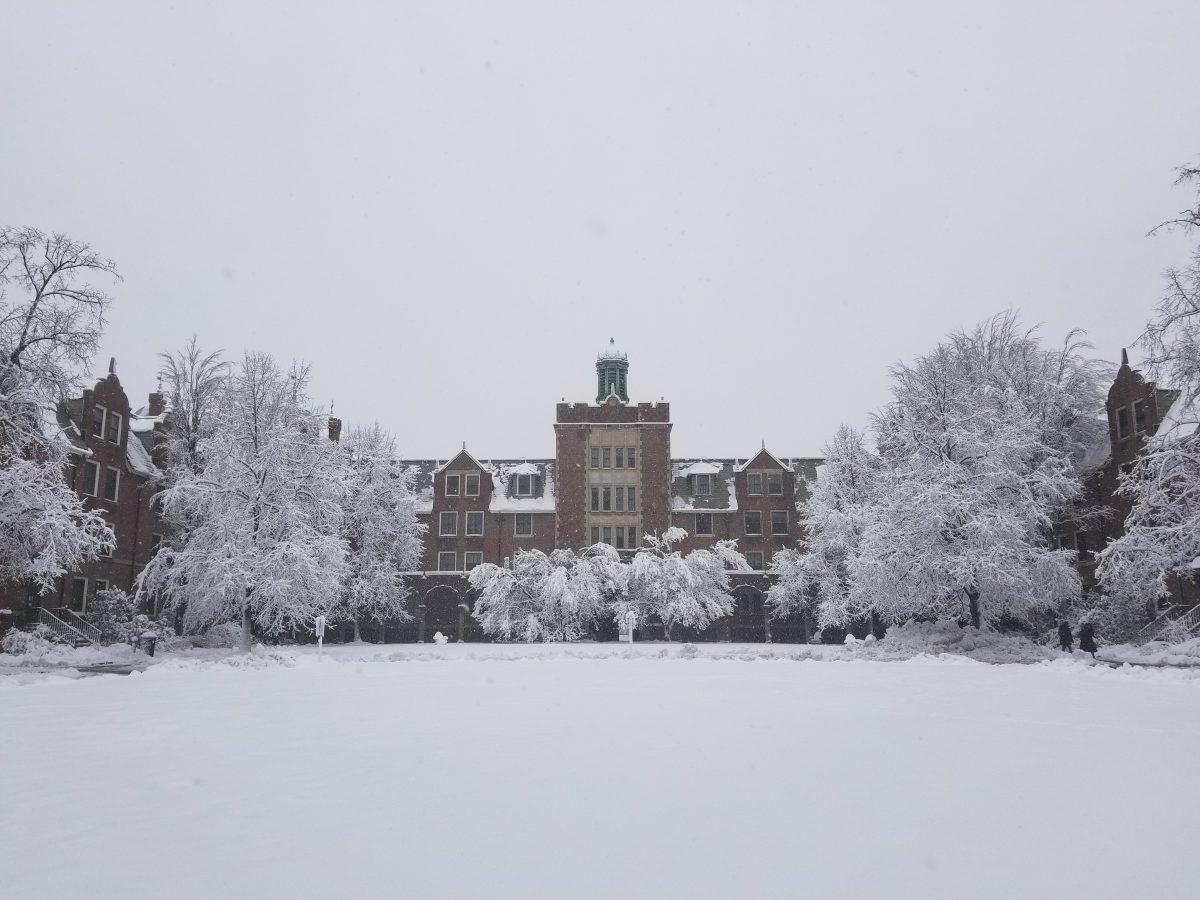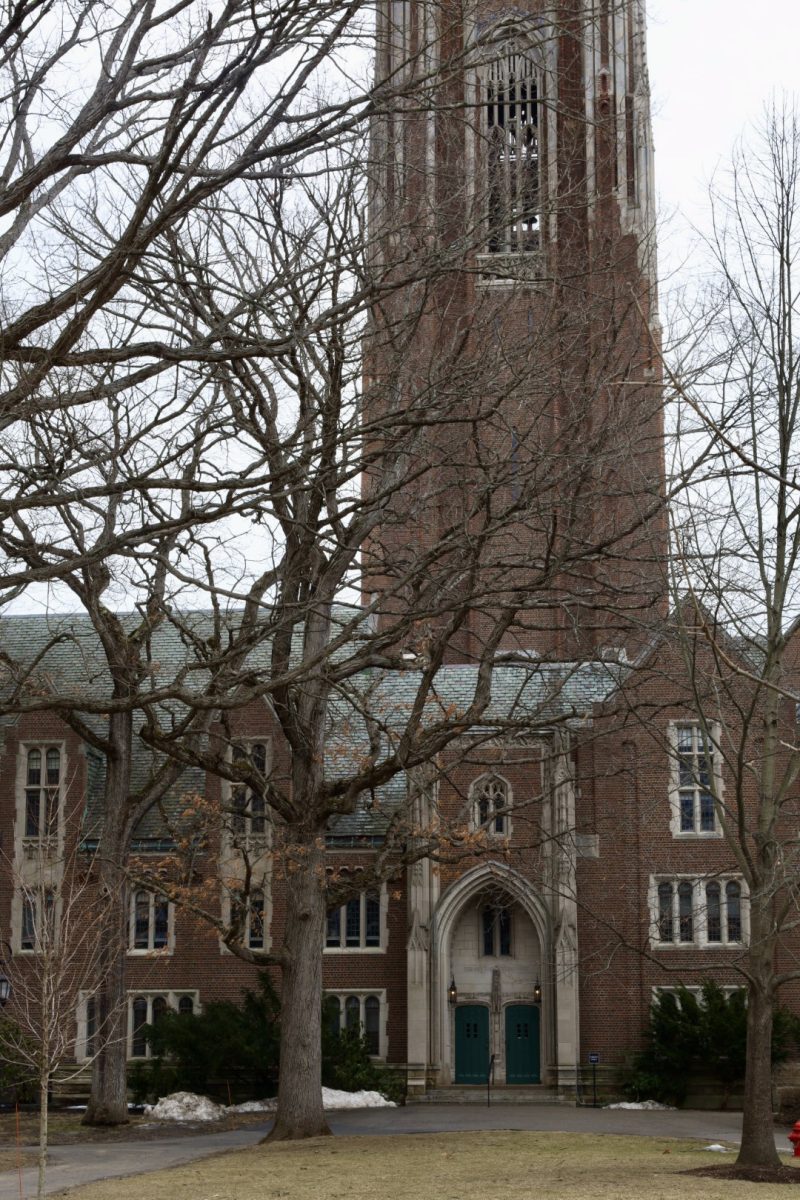Last Wednesday night, the northeast was hit with Winter Storm Quinn, which brought up to a foot of snow in some areas and caused power outages throughout the night across the state. The nor’easter followed Winter Storm Riley, which battered the east coast with strong wind, coastal flooding and heavy precipitation from March 1 through 4. Although many students hoped that the heavy snow would close the College the following day, the school remained open. Several classes and events were cancelled, but faculty and staff were expected to report to work as usual, raising safety concerns due to the heavy snowfall, fallen trees and downed electrical wires.
Across the state, CBS Boston reported that over 360,000 customers were without power. Don Newall, assistant director for engineering and operations at the Wellesley Municipal Plant, the electricity provider for Wellesley College and the town, compared the storm to Superstorm Sandy of 2012 in an interview with The Wellesley Townsman “because of the substantial number of outages we’ve had in terms of customer restoration.”
At approximately 12 a.m. on March 8, power cut out across campus for approximately 45 minutes. Shorter outages had occurred earlier in the evening, but none lasted longer than 15 minutes. While the outage caused inconvenience and stress for many students, the situation became more serious for two students who were trapped inside of an elevator in McAfee Hall. Because of the outage, the elevator’s emergency call button and phone were not functioning, nor was there any mobile service in the elevator. By chance, Danielle Pergola ’21 and Rachel Hodes ’21 were able to call out to a passersby, who then called campus police. Pergola and Hodes both expressed how lucky they felt to be on the first floor at the time of the blackout. “We weren’t in-between floors; we were at the first floor. So if we had been below or between floors, nobody would have been able to hear us,” Pergola said.
After campus police had arrived, the Wellesley fire department was called, but they were unable to help Pergola and Hodes immediately. Only after the power had returned could the pair exit the elevator. Both emphasized their concern for their safety. “If the power had been out for a much longer period of time, it seems like we would have been stuck in the elevator for the whole time,” Pergola said. Likewise, Hodes said, “It didn’t feel safe. There was no backup plan or anything.”
Sally Morris ’19 and Rowan Ellis ’19 experienced a stressful situation in Severance Hall. After the power returned around 12:45 a.m., the smoke detector in their room began to go off due to the unit’s age, according to the maintenance worker who re-installed a smoke detector in their room the next day. “Because it was so loud,” Ellis said, “it had kept everyone else on my floor awake, so other people were sitting outside of their rooms kept up by the noise.” Despite multiple calls to campus police, Morris and Ellis’ situation was not solved until about 1:10 a.m.
According to Dominiki Kurz ’20, Morris and Ellis’ neighbor and the person who called campus police on their behalf, only two officers were on duty. After the power came back on and alarms began going off across campus, another officer was called. Eva Mullarkey ’20, another neighbor, was confused about the understaffing. “Everybody was panicking because the power was out. Storms should be a priority for the police to be here and to protect the students,” she said.
For faculty, driving was a major issue in the aftermath of the storm. According to Section 4-1 of the Safety section of the Administrative Handbook, “As a residential college, Wellesley must continue to support its students regardless of inclement weather. The College, therefore, generally does not close. Wellesley is, however, concerned with the safety of its employees, especially when dealing with challenging weather conditions.”
Political science professor Roxanne Euben had difficulty getting to Wellesley on time due to the condition of the roads. “The roads, I thought, were fine; it was the problem with the [fallen] trees and the other people that got into accidents,” she said.
“When I didn’t hear anything from Wellesley, I figured everything was up and on, and I wasn’t sure if I should go or not … but I teach two classes on Thursday, including a seminar, and to cancel that, there would just be no way to make it up … I felt like I had to come in,” she continued.
For Pinar Keskin, assistant professor of economics, the closure of the Wellesley Community Children’s Center (WCCC) became a problem throughout the day. The WCCC schedule adheres to the one set by the Wellesley public schools, so when the district cancelled classes for the day, the WCCC was unable to provide daycare for the children of faculty and staff, as well as families in the town of Wellesley. “It’s hard. For instance, for a comparison, my kids were at MIT daycare for the previous two years, and MIT only closes the daycare when the school is closed,” Keskin says.
Though the economics department was understanding of faculty members’ situations, professors did feel an unnecessary burden put on them due to the storm. “Even if people are understanding that I can cancel my class, that means I am falling behind on lectures and trying to catch up on everything, so it’s hard … While I was teaching, I think about my research, but in between classes, I check whether the babysitter is there, whether she will make it or not,” Keskin explained.
Several students were concerned about Wellesley’s lack of communication in regards to closing the school and the effect the stress would have on classes the next day. Beryce Garcia ’20 expressed that in the midst of midterms, students felt overwhelmed with the stress of experiencing the snowstorm. “I personally feel like it would have been nice if Wellesley had acknowledged or made a statement about what happened last night. Several students, including myself, had to study for our midterms using the flashlight from our phones. In fact, the power went out during my midterm the following day. I feel like we should have been granted a snow day,” she said.
When asked if cancelled classes would have alleviated some of the stress of the power outages and snow storm, Ellis believes that complete closure by the College or even a snow day would have helped students, particularly those with midterms. “When the power went out, the Wifi went out as well, so a lot of people couldn’t do their work. This loud noise kept everyone awake so late at night. And [with the College] not being sensitive to people who had midterms the next morning at 8:30 a.m., they are not going to do well on their midterms or are probably going to have a worse performance because of their inability to get proper rest the night before,” she said.
“I couldn’t go to sleep without preparing for [my presentation], but I couldn’t prepare for it because the Wifi went out. While this alarm was going off, I couldn’t focus on anything, so I ended up having to work until 4 a.m. for the most important presentation of my semester,” Morris said.
Even with the stress of classes the next day, many students noted the exceptional work done by maintenance crews in order to keep campus walkways and roads clear of snow. Katianna Conde ’20 was walking to her residence hall from Pendleton West around 1 a.m. when she saw maintenance workers beginning to plow and shovel sidewalks. “Despite the fact that a snow day would have been nice, I really appreciate all of the people that work to keep Wellesley up and running, even in a snowstorm late at night,” she said.






